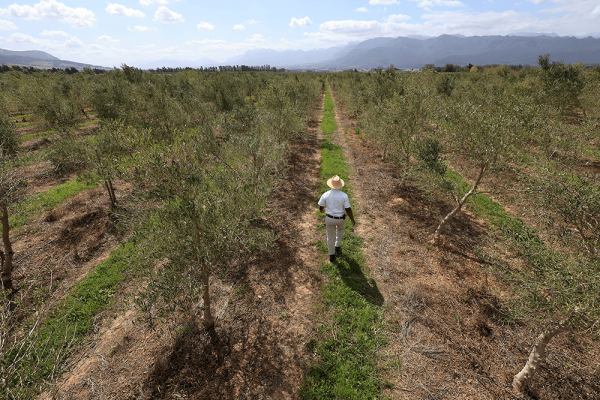Almost 400 white South African pastors, theologians, and Christian educators have signed a statement declaring President Donald Trump’s recent actions cutting off aid to the nation will bring “devastation for our communities” and that his explanation was untrue.
The “Statement from White South African Christian Leaders on Recent Actions by the United States Government,” was created after Trump issued an executive order freezing U.S. government aid to South Africa and promoting the resettlement of “Afrikaner refugees” in the U.S.
According to the Feb. 7 executive order, the actions were ordered because a recent South African law enables the government of South Africa “to seize ethnic minority Afrikaners’ agricultural property without compensation.” The executive order interprets South Africa’s "Expropriation Act of 2024 land reform and ownership policy as being “designed to dismantle equal opportunity in employment, education, and business,” and of spreading “hateful rhetoric and government actions fueling disproportionate violence against racially disfavored landowners.” All of which, the order claims, initiates “aggressive positions towards the United States and its allies” and undermines U.S. foreign policy. The order halts aid and assistance to South Africa “to the maximum extent allowed by law.”
South African President Cyril Ramaphosa has vigorously denied the U.S. characterization of the law, saying that the Expropriation Act was “a constitutionally mandated legal process that ensures public access to land in an equitable and just manner as guided by the Constitution.” The Act targets some of the lingering land ownership inequality issues left unresolved following the collapse of apartheid in 1994. The South African government says Trump’s order “lacks factual accuracy and fails to recognise South Africa’s profound and painful history of colonialism and apartheid.”
Now, Christian leaders across the country are now stepping out to protest Trump’s actions.
“As white South Africans in active leadership within the Christian community, representing diverse political and theological perspectives, we unanimously reject these claims,” reads the statement, first published on Feb. 12.
“The narrative presented by the U.S. government is founded on fabrications, distortions, and outright lies,” the leaders write. “It does not reflect the reality of our country and, if anything, serves to heighten existing tensions in South Africa. It also detracts from the important work of building safer, healthier communities and addressing the complex history of land dispossession by white Europeans from the black African majority.”
Four South African Christian leaders are publicly credited with authoring the statement: Cobus van Wyngaard, minister of a Unisa and Dutch Reformed Church in Pretoria; Craig Stewart, of St. Peters Anglican Church, Mowbray; Curtis Love, theologian at the University of South Africa, Johannesburg; and Sarah Montgomery, of the Lifespring Community Church in Durban.
According to van Wyngaard, the statement came from Christian leaders who began corresponding after Trump’s executive order was issued.
“Initially two or three of us started talking online about a possible response,” he said., “About six or seven people gave inputs on the statement.”
Van Wyngaard emphasized that the authors of the statement are also from different church backgrounds and different cities all over the country, saying the group “wanted to make clear as white Christian leaders we are not comfortable or agreeable with Trump statements.”
The two-page missive had received 385 signatures of support by the evening of Feb. 17, with responses from leaders of a wide variety of Christian churches and organizations across South Africa.
“We must protest in the strongest possible terms where we see racial politics being weaponized in ways that will contribute to the early death for the poor and vulnerable, while serving the political agendas of the powerful,” reads a section that van Wyngaard highlights as the central message of the statement.
Trump’s accusations, van Wyngaard says, are “an overrepresentation of who are the victims of violent crime in this country. White South Africans are generally safer than Black South Africans. Creating a narrative that there is a systematic targeting of white South Africans undermines the broader community efforts of safety in this country.”
South Africa has a long and complicated history of Dutch and British colonialism, followed by a period of white minority rule which culminated in the policy of apartheid from 1948 until 1994. Elon Musk, a white South African, grew up during the immensely violent years of 1970s-1980s apartheid, including the famous 1976 Soweto, Johannesburg Uprising led by Black students against the apartheid government. Musk has been heavily involved in the Trump Administration through his role as an adviser to Trump and the Department of Government Efficiency.
“Through layers of conquest and legal processes the vast majority of land, resources, and control of society was placed fully under white control,” said Van Wyngaard, who also works as a theology educator at the University of South Africa. “Even while misreading the actual processes of redresses that forms part of recent legislative changes, Trump’s executive order is explicit in its attempt at working to protect the interests of ‘ethnic minority descendants of settler groups’ by seeking to punish South Africa for its ongoing work at dismantling the history of racial inequality that resulted from this colonial and apartheid history.”
In addition to voicing their protests of U.S. official actions, the South African Christian leaders also spoke directly to American Christians in their statement, voicing concern for Christians in the U.S.
As South Africans who are Christian, followers of the ways of Jesus, … we are conscious that the current U.S. government administration identifies and draws support from significant parts of our fellow believers in the USA. Recalling our history where the Christian faith was used to justify the oppressive colonial and apartheid regimes tacitly and explicitly, we have watched in horror as political rhetoric in the United States of America has also drawn on the Christian faith in ways which dismiss the most basic Christian call to caring for the vulnerable, loving of neighbours, and working for a good society for all. Such distortions of Christianity have produced innumerable violences, and the justifying of such violences in the name of Christianity is something we condemn and reject as leaders of our faith.
“We wanted the statement to give a voice to our colleagues, friends, and sister organizations and churches in the USA,” van Wyngaard said. “We wanted them to know where we stand here, and that we are aware that you are facing a moment in terms of struggle for justice in your own country. We stand in solidarity with you.”
Craig Stewart, a member of St. Peters Anglican Church in Cape Town and one of the creators of the document, offered his thoughts.
“We came together over a weekend despite some of us never having had a conversation with each other. We came together because at times like this something needs to be said. We don’t perceive ourselves to be the leaders of a new movement or action. We are encouraging the signatories to reflect on (Trump’s) statement and decide how they will act in response to it over the coming months and years, as will we.”
Got something to say about what you're reading? We value your feedback!






